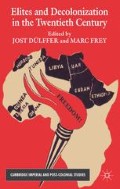Abstract
This chapter examines the experience of Jawaharlal Nehru in the processes of decolonization. It focuses mainly on the 1930s–1950s, the transitional period of the end of British rule in India and the making of a new nation-state in India. We might call this phase “the long decolonization,” as the British devolved power constitutionally to Indian politicians and began to appoint Indians to senior roles in the civil service and the army, while at the same time much that was colonial in origin remained even after formal independence. Contrary to his popular image as a member of India’s political elite who moved seamlessly as Gandhi’s heir to become India’s first Prime Minister — much admired, successful at integrating India and maintaining her stability and establishing her as a world player — this chapter probes some of the problems of his role, particularly the dilemmas of his colonial inheritance.
Access this chapter
Tax calculation will be finalised at checkout
Purchases are for personal use only
Preview
Unable to display preview. Download preview PDF.
References
Austin, Granville (1966) The Indian Constitution: Cornerstone of a Nation (London: Oxford University Press).
Brass, Paul R. (1965) Factional Politics in an Indian State: The Congress Party in Uttar Pradesh (Berkeley and Los Angeles: University of California Press).
Brown, Judith (2003) Nehru: A Political Life (London and New Haven: Yale University Press).
Gould, William (2004) Hindu Nationalism and the Language of Politics in Late Colonial India (Cambridge: Cambridge University Press).
Jannuzi, F. Tomasson (1974) Agrarian Crisis in India: The Case of Bihar (Austin and London: University of Texas Press).
Kochanek, Stanley A. (1968) The Congress Party of India: The Dynamics of One-Party Democracy (Princeton, NJ: Princeton University Press).
Low, D. A. (1997) Britain and Indian Nationalism: The Imprint of Ambiguity 1929–1942 (Cambridge: Cambridge University Press).
Nehru, Jawaharlal (1936) An Autobiography (London: John Lane The Bodley Head).
Nehru, Jawaharlal (1946) The Discovery of India (New York: John Day Company).
Nehru, Jawaharlal (1972–82) Selected Works of Jawaharlal Nehru, 1st Series, ed. S. Gopal (New Delhi: Orient Longman).
Nehru, Jawaharlal (1984) Selected Works of Jawaharlal Nehru, 2nd Series, eds. S. Gopal, R. Kumar, and H. Y. S. Prasad (New Delhi: Jawaharlal Nehru Memorial Fund).
Parathasarathi, G. (ed.) (1985–1990) Letters to Chief Ministers 1947–1964, Vol. 1–5 (New Delhi: Jawaharlal Nehru Memorial Fund).
Potter, David C. (1986) India’s Political Administrators 1919–1983 (Oxford: Clarendon Press).
Reeves, Peter (1987) “The Congress and the Abolition of Zamindari in Uttar Pradesh,” in J. Masselos (ed.) Struggling and Ruling: The Indian National Congress 1885–1985 (London: Oriental University Press).
Tomlinson, Brian Roger (1976) The Indian National Congress and the Raj, 1929–1942 (London and Basingstoke: Macmillan).
Weiner, Myron (1967) Party Building in a New Nation: The Indian National Congress (Chicago: University of Chicago Press).
Editor information
Editors and Affiliations
Copyright information
© 2011 Judith M. Brown
About this chapter
Cite this chapter
Brown, J.M. (2011). Nehru — the Dilemmas of a Colonial Inheritance. In: Dülffer, J., Frey, M. (eds) Elites and Decolonization in the Twentieth Century. Cambridge Imperial and Post-Colonial Studies Series. Palgrave Macmillan, London. https://doi.org/10.1057/9780230306486_10
Download citation
DOI: https://doi.org/10.1057/9780230306486_10
Publisher Name: Palgrave Macmillan, London
Print ISBN: 978-1-349-31857-5
Online ISBN: 978-0-230-30648-6
eBook Packages: Palgrave History CollectionHistory (R0)

